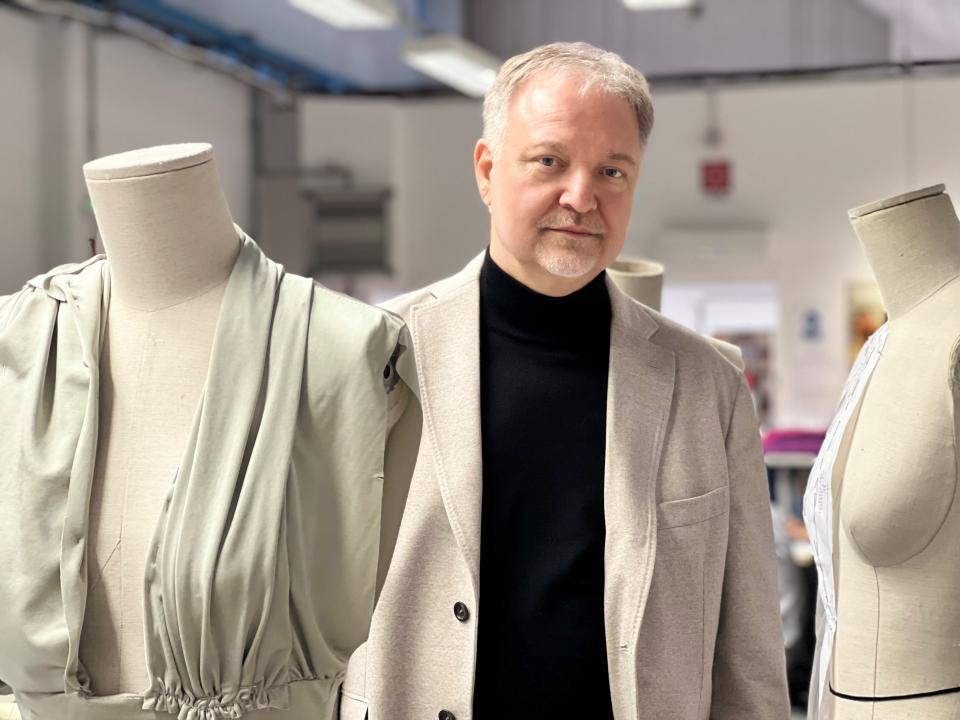Gruppo Florence CEO Attila Kiss on Investments, Strategies

MILAN — Gruppo Florence may be known for its rapid expansion and M&A strategy, but there is much more than meets the eye, according to chief executive officer Attila Kiss.
“We are not simply collectors of some of the best examples of Italian manufacturing companies; it’s time now to shine the light on our industrial and innovation projects,” Kiss contended. “Our goal is to transform the system and the pipeline into something more modern while defending the value of excellence.”
More from WWD
Gruppo Florence was established in October 2020 with the goal of developing a platform to supply high-quality Made in Italy products to major luxury fashion brands, leveraging competitive prices, guaranteeing prompt and flexible deliveries and solutions, while safeguarding the technical and cultural know-how of small and medium-sized family-owned Italian companies.
Since then it has grown to own around 24 companies, including Metaphor, which produces high-end knitwear; informal outerwear manufacturers Emmegi and Giuntini; Ciemmeci, a company that specializes in the production of leather and fur pieces; Confezioni Elledue, a specialist in casual outerwear based in Tuscany, and footwear specialists Lorenza Calzaturificio and Novarese.
As is customary for Gruppo Florence, which Kiss said has reached sales of 600 million euros, the founding families have agreed to reinvest minority stakes in the holding.
“Sure, the group has acquired so many companies in such a short period, but this is no longer the news,” said Kiss, who wants to shift the attention to what is behind the scenes. “The true news is, what happens within the group?” he said.
The launch of a new website on Monday is in line with this objective. It is divided into four chapters: Officina, Auxilium, Academia and Enzyme.
Officina highlights the foundations of the project, its extensive production capacity, from prototyping to quality control of the different business units, ranging from apparel, shoes, leather goods and “intermediate workmanship,” or accessories and details used to create exclusive products.
“The pipeline is beginning to struggle to keep up with the brands and their increasingly more sophisticated requests,” explained Kiss. “Because of the size of these smaller companies, they are exposed to risks and we don’t want to lose this precious know-how.”
Hence, Auxilium, or help, that Florence provides. Sustainability, for example, has become a key issue and a serious obstacle to overcome for some smaller companies, which “are under enormous pressure to comply” but don’t have the tools, the expertise and the means to navigate through the “hundreds of different forms each brand sends their way to trace production. They often don’t have the funds to turn to outside consultancy. We have an in-house team that monitors almost 1,000 suppliers,” Kiss pointed out.
Auxilium contributes to economic, social and environmental sustainability through the control of the entire production pipeline, and special projects in partnerships with the international brands. “These brands cannot map out their objectives in sustainability without the pipeline’s contribution,” observed Kiss.
Academia looks to the future, creating training initiatives, working with schools and connecting the students with the companies, while offering new technology.
Enzyme is an open community of innovators, entrepreneurs and creative talents that work to transform the luxury pipeline, spurring innovative solutions through collaborations to test and expand new initiatives, experiment materials, technology and products, explained Kiss.
The site will speak to potential clients and partners, and people who may want to work for the group, stimulating potential and future collaborations, he continued.

“We pair with entrepreneurs who understand that we work as a group, which allows them to be faster and protected,” said Kiss. “There is constant interaction between the entrepreneurs, who are curious and dynamic, and the managers. We want to create a group that is highly flexible. Crafted Luxury Group describes our vision to dedicate resources to brands offering sustainability and digital transformation while preserving the tradition and manufacturing skills.”
Gruppo Florence is controlled by private equity fund VAM Investments, Fondo Italiano d’Investimento and Italmobiliare.
Former Bulgari and LVMH Moët Hennessy Louis Vuitton executive Francesco Trapani is chairman of Gruppo Florence and of VAM Investments.
“We don’t do turnarounds; the companies in the group are all healthy,” stated Kiss.
Gruppo Florence is also earmarking investments of around 20 million euros, of which around 50 percent is destined for the expansion of the operations, production and commercial spaces; 4 million euros will be channeled into technology, and 5 million euros in the strengthening of the production and logistic plans to support a higher level of service.
With the goal to expand production and build new plants to move some steps internally, improving the welfare of employees and the industrial performance, and investing also in machines, the group is planning a number of real estate projects.
These include: the expansion of the production area of Giuntini, in Peccioli, near Pisa; of the Mely’s knitwear company’s site; new headquarters for outerwear company Elledue; the expansion of jersey producers Manifatture Cesari and Pigolotti; new headquarters for Parmamoda, specialized in women’s lightweight apparel, and a new production site for footwear company Taccetti.
The group expects to hire 200 new employees, seeking tailors and quality control technicians, operations managers or IT and legal specialists, to name a few positions.
As reported, in March Kiss revealed during the Future for Fashion conference in Florence that the company’s “destiny” is an initial public offering. Speculation has recently been circulating that private equity fund Permira was eyeing an investment in Gruppo Florence.
Best of WWD

